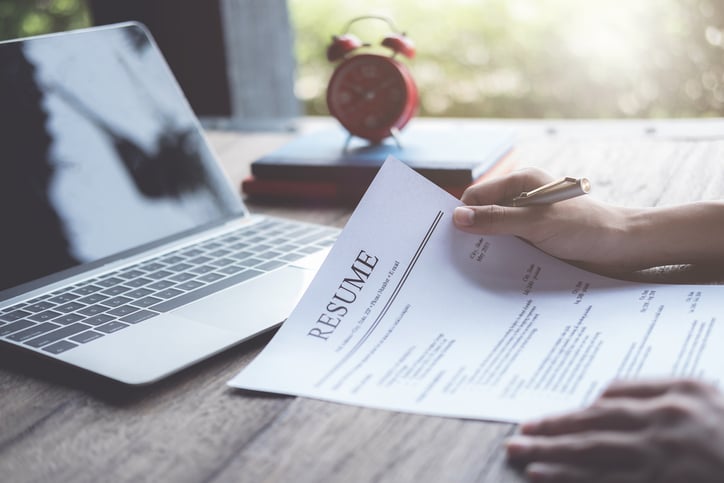
By
Leanna Seah
August 14, 2024
Updated
August 14, 2024
Are you struggling to stand out in a competitive job market?
Feeling frustrated that your resume isn’t getting the attention it deserves?
You're not alone. Many job seekers find it challenging to get noticed by recruiters and hiring managers.
The good news is that optimising your LinkedIn page and filling in all the profile sections with valuable information can be a game-changer.
Your LinkedIn profile page works just like an online resume. It gives you the opportunity to showcase your skills and experiences online, and you can also browse for jobs on the site.
Imagine a LinkedIn profile that not only highlights your qualifications but also makes you irresistible to recruiters. This blog will help you to transform your LinkedIn profile into a magnet for job opportunities, helping you land your dream role faster.
Check out the video below with a few LinkedIn profile tips and tricks that we've selected for you:
How to build a personal brand?
Whether you're an emerging professional or a seasoned leader, cultivating your personal brand is essential for advancing your career. LinkedIn stands out as the premier social media platform for this purpose, especially in the digital age.
Building a robust personal brand is crucial in today's professional landscape. It reflects your unique skills, experiences, and values, setting you apart from other candidates and making you more than just a name on a resume.
A strong personal brand allows you to share your professional story, highlight your expertise, and increase your visibility within your industry. It also fosters trust and credibility, helping you form meaningful connections with peers, clients, and prospective employers.
In the LinkedIn-centric professional world, a compelling personal brand can unlock invaluable opportunities and propel you towards your career goals.
10 essential LinkedIn profile tips to help you find your next job role
Step 1: Upload a professional profile photo of yourself
Your profile picture is your first chance to grab potential employers’ attention when viewing your profile. Having a profile picture makes your profile more personable and makes you appear more approachable.
Your LinkedIn page should feature a more professional image than other social media sites. 90% of recruiters regularly use LinkedIn to look for candidates so this is especially important if you’re applying for jobs and want to attract recruiters.

Source: Linkedin
If you have one, you can use a professional headshot from your current place of employment. But don’t worry if you don’t. There are a number of ways to produce professional photos in your home:
- Wear clothes you’d wear for a job interview
- Stand in front of a plain background with as few visual distractions as possible
- Make sure the picture is taken with good lighting - natural lighting is best if possible!
- Selfies are okay if the angle is straight on and your arm isn’t visible in the photo. However, for better results, ask someone else to take the photo for you
Step 2: Add your location
When you’re creating your profile, be sure to add an accurate location, including your country and zip code or postcode. This makes your profile searchable for employers, recruiters and people interested in networking with you.
Uploading your specific location will also help LinkedIn curate jobs that are local to you. You’ll also get notifications with news and articles that are trending in your area.
Step 3: Include your contact information
Having contact information such as your email address on your profile is highly beneficial if you’re job-hunting. It means employers and recruiters interested in speaking to you will have a way of getting in touch with you directly.
LinkedIn also allows you to discreetly set your profile status as ‘open to new opportunities’. This means that recruiters know you’re looking for a job when they find you in search results. You can select this option under ‘LinkedIn preferences’.
Step 4: Provide detailed experience and list your skills

The work experience section of your LinkedIn profile works in the same way as a traditional resume. However, there’s more space to expand on each position.
Detailing your job duties for each role you’ve had helps hiring managers and recruiters match you to the perfect job. When you explain your core responsibilities, try to include search-optimised keywords specific to the job and your skills. This will help you appear higher up in LinkedIn's search results.
Including a mix of hard and soft skills will let recruiters know what you’re good at. It will also help them to find you when conducting a candidate search using the relevant key terms.
We also recommend including your accomplishments alongside your skills and, where possible, include measurable results to back them up. For example, if analytical thinking is one of your skills, mention specific ways you’ve used this skill in practice.
Finally, make sure you add accurate information to your headline. Most recruiters will use keywords such as job titles to find candidates for their roles. However, many job seekers put ‘seeking opportunities’ in their headlines.
Recruiters won’t be searching for such broad terms, so using this technique could lower your chances of being found. Instead, always include your current job title.
Step 5: Create a custom URL
The default URL that comes with your LinkedIn account consists of your name and a string of numbers and letters. This URL is quite clunky and difficult to share with people.
A customised URL makes it much easier for recruiters and employers to search for you. You can do this from LinkedIn’s Public Profile Settings page. You can create a personalised URL that includes your name, e.g., linkedin.com/in/john-smith.
Your personalised URL will be easier to remember and look much cleaner when printed on your resume.
Step 6: Write a summary
Your LinkedIn profile summary is a prime opportunity to highlight relevant skills and share why they matter in your career journey. Positioned below your profile photo, name, and headline, this section allows you to market yourself in a way that resonates with real people, particularly recruiters.
With 2,000 characters at your disposal, don't hesitate to include numerous industry-specific keywords—just ensure your summary remains natural and not overly spammy. This strategy will enhance your visibility in LinkedIn searches conducted by recruiters.
To maximise effectiveness, analyse job descriptions for positions you're interested in to identify recurring keywords. Incorporate these keywords to emphasise your skills, making your profile more appealing to recruiters and hiring managers. You can present this information in bullet points, similar to a resume summary, to ensure clarity and impact.
Step 7: Connect with other professionals
As well as being a professional profile, LinkedIn is very useful for keeping in touch with your colleagues and teammates. The bigger your network of connections, the more likely you are to get discovered by employers and recruiters. This is especially true if you share relevant content on your account (we’ll come to this in a moment).
Growing your connections widens your network and helps you establish yourself as an expert in your field. It also gives you more exposure and validates your position and status in your field of expertise.
As you navigate social media, keep in mind the best practices for fostering relationships. Avoid overwhelming people with connection requests. Instead, focus on reaching out to individuals who share your industry and interests, and take the time to personalise each message you send.
Step 8: Share valuable content and information

Sharing relevant information, such as blogs and studies, on your LinkedIn page adds value to your profile. It shows potential employers how you engage professionally.
Publishing valuable content on LinkedIn can strengthen your digital footprint. Posting regularly will help you to create trust among your connections. It also helps you to be seen as an expert on the topic you’re posting about.
Step 9: Turn on the "open to work" feature
LinkedIn's "Open to Work" badge is a game-changer for job seekers. By activating this feature, you essentially hang out a digital "I'm available!" sign, making your job search intentions clear to your professional network and potential employers.
This visibility boosts your profile in search results, increasing your chances of being noticed by recruiters actively seeking candidates with your skills. It's also a great conversation starter, encouraging your connections to introduce opportunities or offer recommendations.
Essentially, it's like having a personal billboard on LinkedIn that says, "Let's talk business," making it easier to find new opportunities in your field.
Step 10: Ask for recommendations
Seeking recommendations on LinkedIn is a powerful way to enhance your profile with social proof. These testimonials from colleagues, supervisors, peers or clients can bolster your credibility and showcase your skills to potential employers.
Recommendations not only highlight your past achievements but also demonstrate your ability to build relationships within your professional community. By fostering these connections, you pave the way for future opportunities.
Don't hesitate to ask for endorsements from individuals who can speak to your strengths and contributions. Their positive feedback can be invaluable in your job search.
For more tips on finding a job, check out our jobseekers' guide.
Let Airswift help you in your job search!
Ready to find your next role? Let Airswift help! Visit Airswift Digital to browse our current vacancies.

